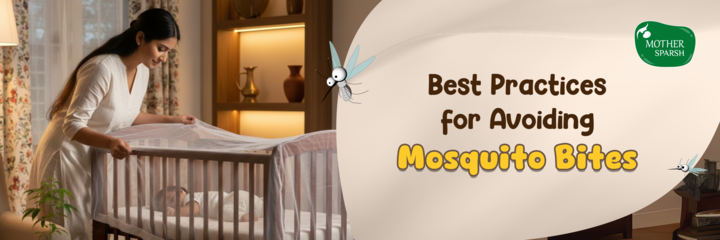
Best Practices for Avoiding Mosquito Bites in Indian Homes
If you’ve ever found yourself in a dark room, listening to that tiny, high-pitched whine of a mosquito, you know the frustration. That sound alone can disrupt a peaceful night’s sleep.
For parents in India, it’s more than just an annoyance. Mosquitoes can carry diseases like dengue, malaria, and chikungunya, making their presence a real concern for family safety. The goal is to create a safe haven at home, and the good news is, you can.
Effective strategies to avoid mosquito bites in India are about building smart, consistent layers of defence. By combining simple home hygiene with trusted natural remedies and safe modern solutions, you can protect your loved ones and reclaim your peace of mind.
Table of Contents
Keep Your Home Mosquito-Free
Your first and most powerful line of defence begins with your home environment. Creating a space where mosquitoes can't breed or hide is the foundation of effective mosquito protection at home.
Eliminate Stagnant Water Around the House
Mosquitoes need only a tiny amount of stagnant water to lay their eggs. Eliminating these breeding grounds is the most crucial step in how to prevent dengue at home in India.
Make it a weekly habit to do a quick 5-minute audit of your home. Look for and drain any standing water in these common spots:
-
Flowerpot saucers and trays
-
Air cooler tanks
-
Discarded tires, coconut shells, or containers in the yard
-
Clogged drains and gutters
-
Pet water bowls (remember to change the water daily)
Install Nets, Screens & Door Closures
Physical barriers are a simple and 100% chemical-free way to keep mosquitoes out.
Invest in good-quality mesh screens for your windows and balcony doors. This allows you to enjoy fresh air without inviting pests inside. For sleeping, a classic mosquito net (machardani) is an unbeatable shield, especially for infants and young children.
Natural Remedies Indian Homes Trust
For generations, Indian families have relied on the power of nature to repel mosquitoes. These methods are gentle, effective, and often fill your home with a pleasant, natural aroma.
Neem, Tulsi & Camphor as Natural Shields
These three ingredients are staples in traditional Indian wellness for a reason.
-
Neem: Known for its potent insecticidal properties, burning a few dried neem leaves during the evening can effectively smoke mosquitoes out of a room.
-
Tulsi (Holy Basil): This sacred plant is a natural mosquito repellent. Keep a few tulsi plants near your windows and entryways to deter mosquitoes from coming inside.
-
Camphor: A fantastic and easy-to-use solution. Place a few camphor tablets on a heat-proof dish, light them, and close the room’s doors and windows for 15-20 minutes. The fumes will clear the room of mosquitoes.
Protective Habits for Families
Simple changes in your daily routine, especially during peak mosquito hours, can drastically reduce the number of bites your family receives. This is a truly chemical-free mosquito solution for families.
Clothing Choices in the Evenings
When your children are playing outdoors or you’re relaxing on the balcony during the evening, what you wear matters.
Mosquitoes are attracted to dark colors and body heat. Encourage everyone to wear light-colored, loose-fitting, and full-sleeved clothing to cover the skin and make it harder for mosquitoes to land and bite.
Smart Home Habits at Dusk
Mosquitoes are most active and likely to enter your home at dusk and dawn.
Make it a household rule to shut all doors and windows just before sunset. This simple habit, often called a "dusk lockdown," prevents the evening swarm from getting inside and setting up for their nighttime hunt.
Safe Mosquito Protection for Babies & Kids
When it comes to our children, especially infants, safety is paramount. While home hygiene and natural remedies are crucial, sometimes you need on-the-go protection or an extra layer of defence at night.
Why Parents Prefer Natural Repellents
Many conventional mosquito repellents contain chemicals like DEET, which can be harsh on delicate skin and a concern for parents of young children. The strong, synthetic smell of coils and liquid vaporizers can also be irritating.
This is why a growing number of parents are searching for the best safe mosquito repellent for kids in India. They are turning to gentle, natural formulas that offer effective protection without the worry.
A Gentle, Modern Solution for Little Ones
Instead of relying on chemical-heavy sprays, many Indian parents now prefer natural alternatives like Mother Sparsh mosquito patches, a form of mosquito protection safe for newborns and toddlers. These innovative mosquito patches for kids can be stuck directly onto clothing, cots, or strollers, creating a protective bubble of natural, pest-repelling aroma without anything touching your baby’s skin.
For broader application, a plant-based mosquito repellent spray or fabric roll-on from their range provides the same gentle yet effective shield using ingredients like citronella, lemongrass, and eucalyptus oil. This makes them a trusted choice when looking for a natural mosquito repellent for babies.
Blending Tradition with Safe Modern Care
Creating a mosquito-free home is not about a single magic solution, but about a smart, layered strategy.
By combining the timeless wisdom of traditional Indian remedies with diligent home care and the gentle effectiveness of modern, natural repellents, you can build a comprehensive shield for your family. This integrated approach ensures complete mosquito protection at home, allowing for peaceful nights and worry-free days.
Frequently Asked Questions (FAQs)
The safest mosquito repellents for babies in India are natural and toxin-free options. Parents usually choose repellents with ingredients like citronella, eucalyptus, and lemongrass instead of harsh chemicals. Products such as mosquito repellent patches or fabric roll-ons are safer than sprays or creams because they don’t touch the skin directly, making them suitable even for newborns.
DEET is not safe for infants under 2 months. For older babies, only very low concentrations should be considered, and even then, with caution. Since DEET can irritate delicate baby skin, many parents in India prefer natural mosquito repellents instead of chemical-heavy formulas.
Yes, when made from natural oils, mosquito patches are considered safe for babies. They stick onto clothes, cots, or strollers instead of the skin, which reduces the risk of irritation. This makes them a convenient choice for parents who want chemical-free mosquito protection for babies and toddlers.
For babies, natural repellents are the safest option. DEET, picaridin, and IR3535 work well for adults but may cause reactions on sensitive baby skin. Oil of Lemon Eucalyptus (OLE) is also not advised for kids under 3. That’s why most parents choose citronella- or eucalyptus-based repellents designed especially for infants.
- Never apply directly to your baby’s face, hands, or broken skin.
- For sprays, apply on clothes instead of skin.
- Use patches or roll-ons that stick to clothing or strollers.
- Choose products formulated for babies with natural ingredients.
Babies often seem like mosquito magnets! Their thin skin, higher body heat, and natural scent make them more attractive to mosquitoes. Plus, they can’t swat insects away like adults. That’s why using nets, screens, and safe repellents is essential to protect them.
For newborns, stick to chemical-free methods like:
- Sleeping under a mosquito net (machardani).
- Keeping doors and windows screened.
- Using natural mosquito patches on clothes or bedding (not on skin).
- Removing stagnant water near the house to prevent breeding.
Odomos and similar chemical-based repellents are not recommended for newborns because they contain synthetic actives like DEET. For infants, parents in India usually prefer natural alternatives, such as patches, roll-ons, or sprays made with citronella and eucalyptus oil, that are gentle and safe for daily use.





